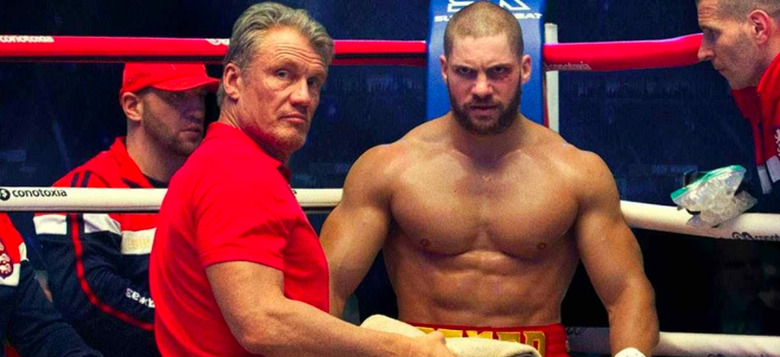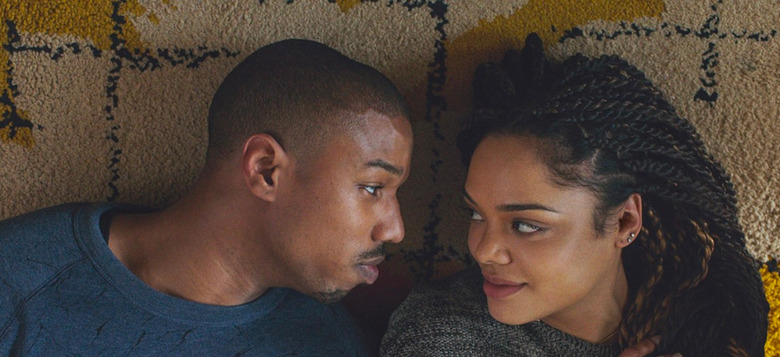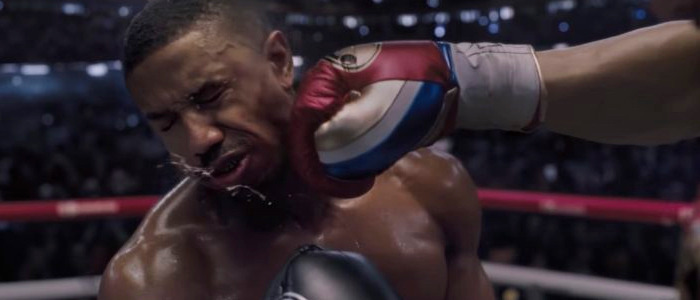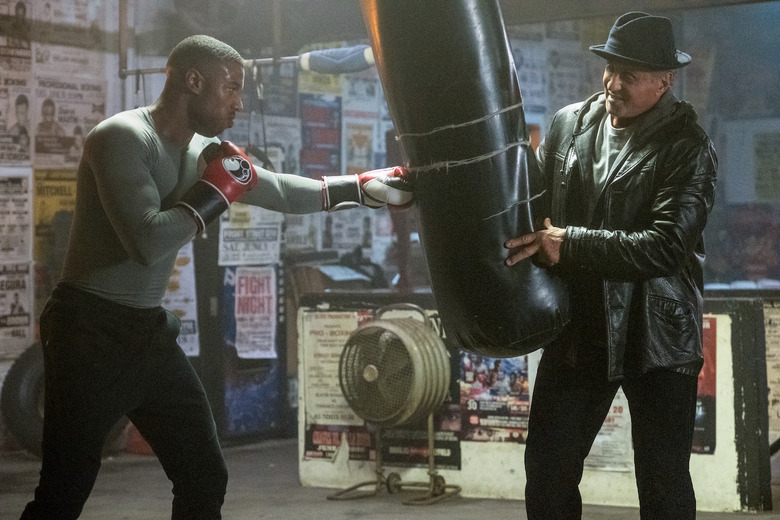The Sins Of Our Fathers: The Hubris Of 'Rocky IV' And The Humility Of 'Creed II'
As a franchise, Rocky has almost always been defined by the hubris of its star and creator, Sylvester Stallone. The original film is not actually so much about boxing as it is about the boxer, a working class guy who has only one skill in the ring and desperately wants to achieve more for himself, and what Stallone gradually lost sight of in writing and directing the sequels is that it was that character struggle that made his film resonate with people. As reflected in the franchise's gradual decent into farce, Stallone felt the key to keeping Rocky Balboa a relevant pop culture icon was to make the fights bigger and the characters in perpetual awe of Rocky's greatness, and the films suffered for it, finally attempting to pull out of the dive with the attempted drama of Rocky V and only finally approaching the heights of the original after a sixteen year hiatus with Rocky Balboa, though even that retained some sillier elements that harken back to Stallone's worst impulses.
This is why Creed felt like such a revelation upon its 2015 release. The decision to make Rocky the supporting character for the son of his greatest rival, Apollo Creed, was an inspired bit of torch-passing, allowing Stallone to remain in the spotlight as a new name took on the legacy of the Rocky series. And that's what Creed is largely about, as Adonis Creed struggles with the legacy and identity left behind by a father he never knew, and while the boxing matches are among the best of the whole series, Creed feels most like a rebirth of the parts of Rocky that struck people so strongly that a franchise was able to form in the first place.
The decision, then, to make Creed II a throwback to Rocky IV is at first a baffling one. Creed references Apollo's death in the vaguest of terms, letting series loyalists understand the circumstances that left Adonis without a father while sidestepping the necessity of explaining to new audiences that Apollo was murdered by a Russian monster man after a performance by James Brown. To make the focus of Creed II an explicit revenge match between Adonis and Ivan Drago's son Viktor would seem to undermine the very notion of the Creed series establishing its own identity beyond Rocky, but here's the kicker: not only is Creed II further cementing Adonis Creed as a separate successor to the heavyweight championship title than Rocky Balboa, but it's also taking a look back in an admission that the Rocky franchise at one point lost its way.
Spoilers for Creed II lie ahead.
The Goofy DNA of Rocky IV
It's pretty universally acknowledged that Rocky IV is one of, if not the worst, installment in the Rocky series, and strangely enough that makes it one of the most watchable. The plot is pure Reagan-era patriotic cheese: the Russians have a mountain of a boxer that they want to destroy the best American boxer, Apollo Creed is killed in the process, so Rocky trains a whole bunch and beats the factory-molded Russian with the power of sheer American gumption. It's a story told with a lot of bizarre, unnecessary flourishes, such as the aforementioned James Brown performance and the inclusion of a semi-sentient robot that Rocky gifts to Paulie, all seemingly present to demonstrate how wealthy and important Rocky is now that he's the greatest boxer ever.
But it's also an efficiently told story, which lends itself to rewatchability but not necessarily reverence. Character growth and even dialogue take a backseat to an infamous collection of montages, stacked back to back to show just how hard Rocky and Drago are training but completely ignoring the emotional stakes of Rocky's best friend having just died in his arms. The emotional beats are taken as a given, with Rocky's revenge being more about symbolically winning for America against moose-and-squirrel caricatures than it is about avenging the arguably second most important character in the series. Rocky IV is the culmination of the series gradually treating the bouts as more important than the characters, completely undermining fans' cause for investment in favor of shallow spectacle that cheaply throws away one of the best on-screen rivalries of popular cinema.
The Key is in the Characters
But this is the brilliance of Creed II: instead of sweeping the shame of that installment under the rug, Creed II is effectively calling the Rocky series out on its faults and actively working to make up for them through evolution and learning across generations. This is a film that looks at Rocky IV and asks "Okay, that sucked, but what can we do to improve upon those foundations?" The answer lies in the characters, the fundamentally lacking piece of the Rocky IV equation that informed all the film's other failings.
Let's start with Rocky himself. Rocky IV never completely explores Rocky's guilt over Apollo's death. Rocky was the man responsible for throwing in the towel should the fight become too much for Apollo to handle, and it was that failure to check Apollo's ego that allowed Drago to kill him. In Creed II, as Adonis barrels headfirst toward an inevitable confrontation with Viktor Drago, Rocky has to come to terms with that guilt, at first refusing to relive that experience but eventually recognizing that he has a place as a reminder of the past, of what mistakes not to make. Rocky is an old man haunted by his mistakes, mistakes that killed his best friend – both in-fiction and metatextually for the franchise – and his role is to guide Adonis on a path that won't repeat those mistakes, even as their situations mirror one another.
This becomes reflected in the film's structure, where Adonis is defeated by Viktor Drago without Rocky in his corner, which echoes Rocky's failure to prevent Apollo's death. But while Adonis does not die, at least in a literal sense, he does enter a depression and existential crisis that are functionally a rebirth for his character. Whereas Rocky IV used this moment of defeat as a launching point for high-speed training montages, Creed II slows down and becomes meditative. Up until this point, Adonis' motivations for fighting Viktor were enigmatic, hidden beneath layers of bluster that recalled his father's confidence prior to fighting Ivan. But after that initial defeat, Adonis starts to come to terms with his motivations, recognizing that the legacy he had embraced in the previous film does not need to be what defines him.
Creed II Looks to the Past to Define Its Future
There is a persistent theme of generational continuance throughout Creed II. Rocky is demonstrated as treating Adonis as a surrogate son at the expense of his own son and grandson, while Adonis unexpectedly becomes the father of a little girl with his fiancée Bianca, and the connective tissue that draws a line from the past to the future is not just there to recall nostalgia for previous films. Adonis' recognition that fighting to live up to his father's legacy is not enough is the second act turning point of this film, the realization that he can recognize the importance of those who came before without needing to shoulder the burden of fighting on their behalf. His obligations are instead to his own family, to his fiancée and their daughter, or if we want to get symbolic, to the modern and future audiences who will look to Adonis Creed as an icon in his own right separate from Rocky Balboa.
It's only after that character-centric realization that Adonis enters this film's equivalent of Rocky IV's montage sequence, and while it is stylistically and narratively tighter on a technical level, it's also reflective of the film's ethos. Whereas Rocky IV showed Rocky as a self-made athlete in isolation, devoid of human interactions that inform his growth, Creed II shows Adonis as surrounded by influences, Rocky included, who shape his training regimen even as his growth is demonstrably the product of his own drive. He's building on the foundations of the past to forge his own path, both within the narrative and as the face of a growing and continuing franchise, which is perhaps most noteworthy in how the film makes a point of showing Rocky's bow out of the world of boxing. He does not share in Adonis' victory over Viktor, doesn't take any credit for Adonis' new path forward even as he recognizes the groundwork he laid for Adonis to get here. His time is done, and it's important for him to acknowledge his real family, the family the functions as the modern corollary to the characters Stallone shoved aside in Rocky IV. The continuation of the Rocky franchise will be just fine without him, because Adonis has learned from Rocky's mistakes and has the right priorities in place to forge his own path forward.
It's worth noting that the Dragos function largely as a villainous antithesis to Rocky and Adonis, and it's their failure to embrace the future that acts as their downfall. Ivan Drago is now a character defined by his obsession with the past, disgraced by his loss to Rocky Balboa and forced out of Russia as his wife left him and their son. He is an emotionally abusive influence over his son Viktor, whom he has groomed to be a replica of his glory days with the express purpose of reclaiming the prestige his country took from him. Viktor, whose very name is an indicator of Ivan's singular drive, knows nothing but trying to live up to his father's name, and Ivan is so focused on his own failure that he cannot see the damage this does to his son. It's only when Adonis starts to overtake Viktor in the final bout, where the promised return of his ex-wife and his revered position goes up in smoke, that Ivan recognizes what he has done to his son and does what Rocky couldn't three decades ago: he throws in the towel, saving his son from the fate he once delivered to Apollo Creed and realizing that victory cannot come at the cost of his son. He allows his son a future, preventing its implosion under the hubris of his legacy as their final shot together shows them training, not as taskmaster and servant of destiny, but in concert for some unknown goal.
The End of an Era
Creed II is a signal to the end of an overlap between the Rocky and Creed franchises. Rocky's and Apollo's time has come and gone, and the icons not only offer a lot for Adonis' generation to live up to, but they also have a lot of faults from which to learn. Creed II is on one level about Adonis Creed learning to differentiate himself from his father to achieve something his father couldn't, but it's also a declaration of purpose for this franchise. Creed is done living in Rocky's shadow, and this new series knows what pitfalls to avoid in going forward, because it has the benefit of looking to the past to inform its path forward. But that path is Creed's own, and being beholden to Rocky can only serve to hold it back. Rocky IV was a low point in that series' legacy, but Creed II builds upon that foundation to achieve greatness. If that doesn't thrill you for Adonis Creed's future, then perhaps you are as stuck in the past as Ivan Drago was. It's time to throw in the towel, because the future is here and it is very exciting to see how this and future generations will create their new world.




